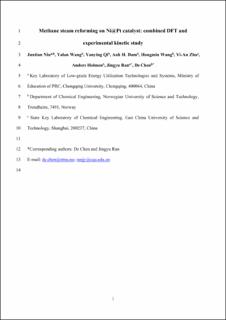New mechanism insights into methane steam reforming on Pt/Ni from DFT and experimental kinetic study
Niu, Juntian; Wang, Yalan; Qi, Yanying; Dam, Anh Hoang; Wang, Hongmin; Zhu, Yi-An; Holmen, Anders; Ran, Jingyu; Chen, De
Peer reviewed, Journal article
Accepted version

Åpne
Permanent lenke
https://hdl.handle.net/11250/2732274Utgivelsesdato
2020Metadata
Vis full innførselSamlinger
Sammendrag
In this contribution, we combine density functional theory (DFT) calculations, experimental kinetic study and DFT-assisted analysis to elucidate the impact of the interface of monolayer Pt on the Ni surface on catalytic performance of steam methane reforming including carbon formation on core-shell (Ni@Pt) catalysts and compare it with Ni and Pt catalysts. We demonstrate that core-shell structured Ni@Pt significantly lowers the carbon formation without sacrificing much the activity. The DFT results demonstrate that the metal identity, core shell structure and support have significant impacts on the reaction mechanisms. The direct methane activation is energetically favorable reaction pathway on Ni, while the OH* assisted methane activation is the favorable pathway on Pt and Ni@Pt catalysts, where methane activation is the rate-determining step on all catalysts. We unambiguously reveal that the core-shell Ni@Pt catalyst modified the surface Pt electron density and shifted d-band center away from Fermi level compared to Ni(1 1 1) and Pt(1 1 1). It results in a strong basic surface OH* which actively reacts with CHx and thus enhances carbon formation resistance. Above all, Ni-core/Pt-shell particle could decouple the activity and carbon resistance to keep the activity and reduce carbon formation simultaneously in methane steam reforming. In addition, by taking into account the activation of steam on the support, the effective activation energy estimated from DFT-assisted analysis is well consistent with the experimental value on the both Ni and Ni@Pt catalysts, which could shed some light on building a bridge between experimental work and DFT-assisted kinetic study.
